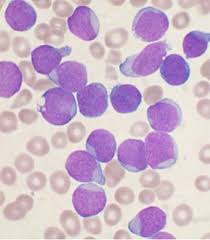
B-cell acute lymphoblastic leukemia.
Outcomes in adults with B-cell acute lymphoblastic leukemia are inferior to those in children, owing in part to the increased frequency of high risk genetic abnormalities and to the toxic effects of high-dose chemotherapy
After establishing a diagnosis of adult ALL, tests are done to find out if the cancer has spread to the central nervous system or to other parts of the body.
There is no standard staging system for adult ALL.
The following tests and procedures may be used to find out if the leukemia has spread:
Chest x-ray
Lumbar puncture sample of CSF is checked under a microscope for signs that leukemia cells have spread to the brain and spinal cord.
CT scan (CAT scan):
MRI (magnetic resonance imaging):
The disease is described as untreated, in remission, or recurrent.
Untreated adult ALL
The ALL is newly diagnosed and has not been treated except to relieve signs and symptoms such as fever, bleeding, or pain.
The complete blood count is abnormal.
More than 5% of the cells in the bone marrow are blasts.
There are signs and symptoms of leukemia.
Adult ALL in remission
The ALL has been treated.
The complete blood count is normal.
5% or fewer of the cells in the bone marrow are blasts.
There are no signs or symptoms of leukemia.
Recurrent adult ALL is cancer that has recurred after going into remission: it may come back in the blood, bone marrow, or other parts of the body.
Standard treatment of adult acute lymphoblastic leukemia (ALL) during the remission induction phase includes the following:
Combination chemotherapy
Tyrosine kinase inhibitor therapy in certain patients.
Supportive care including antibiotics and red blood cell and platelet transfusions.
CNS prophylaxis therapy including chemotherapy (intrathecal and/or systemic) with or without radiation therapy to the brain.
Standard treatment of adult acute lymphoblastic leukemia (ALL) during the post-remission phase includes the following:
Chemotherapy.
Tyrosine kinase inhibitor therapy with imatinib, nilotinib, or dasatinib.
Chemotherapy with stem cell transplant.
CNS prophylaxis therapy including chemotherapy (intrathecal and/or systemic) with or without radiation therapy to the brain.
Standard treatment of recurrent adult acute lymphoblastic leukemia (ALL) may include the following:
Combination chemotherapy followed by stem cell transplant.
Monoclonal antibody therapy (blinatumomab or inotuzumab ozogamicin) followed by stem cell transplant.
Low-dose radiation therapy as palliative care to relieve symptoms and improve the quality of life.
Tyrosine kinase inhibitor therapy with dasatinib for certain patients.
Outcomes for B-cell acute lymphoblastic leukemia relapsed and refractory disease has been historically poor.
Outcomes for adults with relapsed or refractory B- chimeric antigen receptor T cell therapy (CAR-T), blinatumomab, and Inotuzumab are added treatment options.
A trial EPOCH involving toposide, prednisone, vincristine, cyclophosphamide, doxorubicin, and Inotuzumab has shown significant efficacy.
The addition of Blinatumomab to consolidation chemotherapy in adult patients in MRD negative remission from B-cell ALL significantly improved overall survival (Litzow M).
Some of the treatments being studied in clinical trials for recurrent adult ALL include the following:
A clinical trial of stem cell transplant using the patient’s stem cells.
A clinical trial of targeted therapy.
A clinical trial of CAR T-cell therapy.
